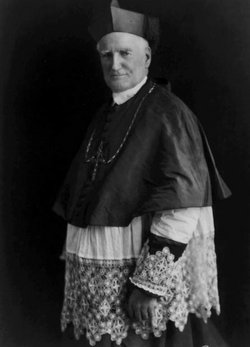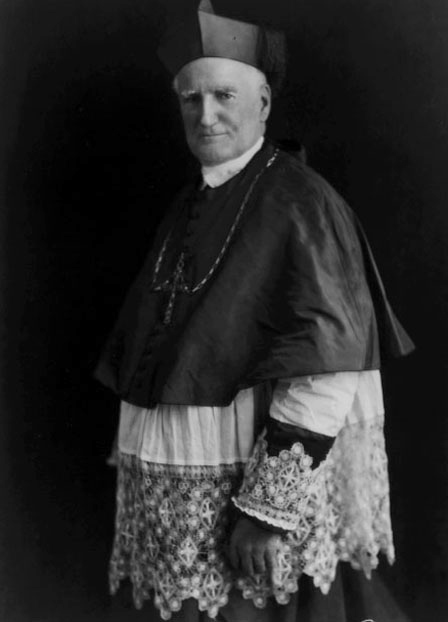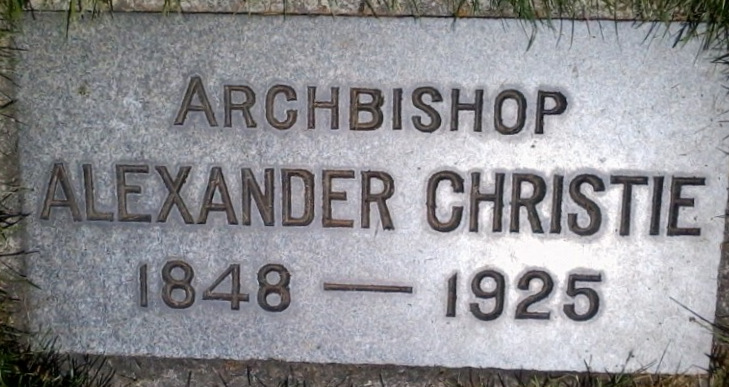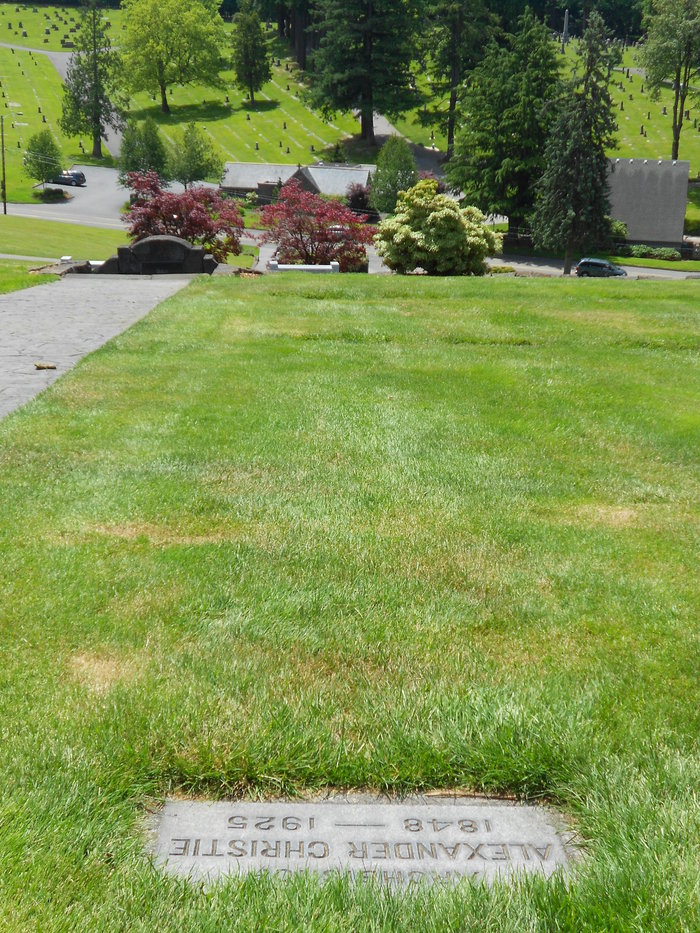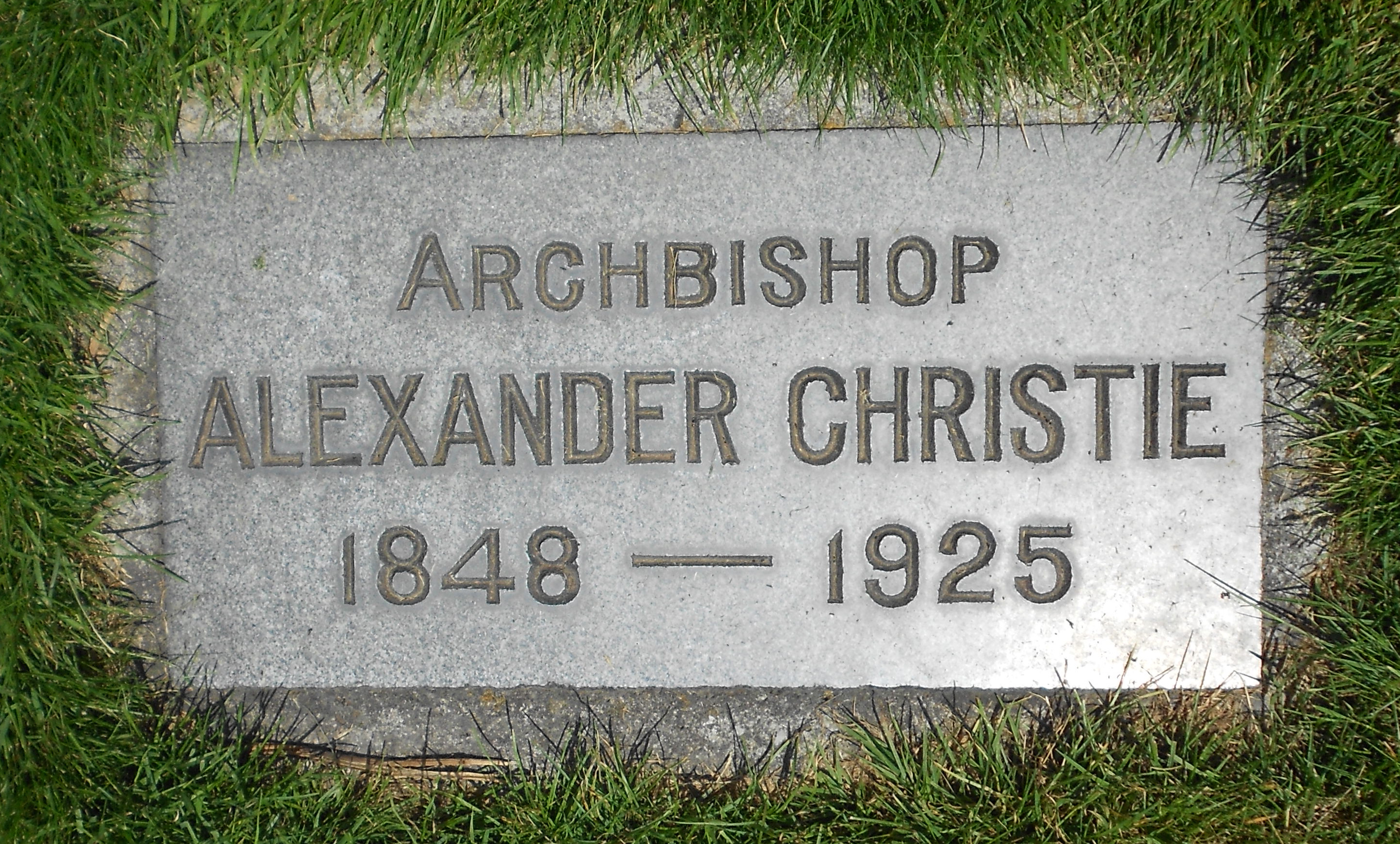Benedictine College of St. John's in Minnesota in 1870 and completed his courses in 1874. On September 11, 1874, he entered the Grand Seminary of Montreal, completing his studies in 1877. He was ordained a priest on December 2, 1877.
Father Christie was assigned as pastor in 1878 to Sacred Heart Parish in Waseca, Minnesota, and served there until 1890. He was noted for being cheerful in the face of the hardships of a frontier missionary life. He was tall and strongly built and had a powerful voice, yet was tender in his consolation of the suffering and the dying. He was certainly eloquent in the pulpit. He set up the new parish of Ascension in Minneapolis in 1890. After getting Ascension off to a good start, he was moved to St. Stephen in Minneapolis, which was in financial trouble, and where he was pastor from 1894 to 1898. He was chosen by Rome and consecrated bishop on June 29, 1898 for the Diocese of Vancouver Island, B.C. He found himself in charge of about 9,000 people in all. He was promoted to the Archiepiscopal See of Oregon City upon the unexpected death of Archbishop Gross.
On May 3, 1899, he notified Monsignor F.X. Blanchet, a nephew of the pioneer archbishop, that his official appointment as Archbishop had come, and that he would arrive on June 15, 1899. The first months were spent in visiting the parishes, the religious priests, and the convents. From the beginning, the new Archbishop showed a greatest interest in education at all levels. He emphasized the importance of the parish school. He did not neglect higher forms, and one phase of this interest was the founding of the University of Portland, or the Columbia University, as he wished it to be called on September 2, 1901.
Because of the great size of the Archdiocese, and the traveling conditions of that time, the Archbishop determined that it would be well to set up another diocese. He obtained permission from Rome to establish the Diocese of Baker. Father Charles O'Reilly was appointed as first Bishop in 1903. While the decision to establish this Diocese was questioned by some, there was an outpouring of support from the clergy, with signed statements by individuals. The same was true of various orders of Sisters who all supported the Archbishop; likewise, the laity rallied to his side. After spending time in various activities, he went to Rome on October 16, 1904.
The Motto of the Archbishop was Faith and Kindness. The years that followed were marked by a steady growth in building churches and schools. The sick and the orphaned were not forgotten. In twenty-five years as Archbishop, he accomplished a record of growth of which to be proud.
During World War I, the Archbishop gave his people steady guidance. From the beginning of his office, he had emphasized the virtue of patriotism. An innovation of those times was the chapel car, which was a railroad car fitted out as a chapel. It could seat some seventy persons with standing room for thirty. The chapel car named St. Anthony came by 1909, and another, the St. Peter Chapel Car, was made available in 1923. This was an early day evangelization effort. The chapel cars were obtained in Chicago, where they were developed.
The outstanding event in the last years of Archbishop Christie's term was the Oregon School bill, which he faced in a condition of failing health, but which resulted in a great success. His outlook had been formed under Archbishop Ireland of Minnesota, a leading exponent of Catholic education, and his goal for Oregon was a school in very parish. Although he was in a physical decline, he was determined to meet and defeat the bill, which was pushed by a wave of bigotry especially directed toward the Catholic school system. The bill, introduced in July and passed in November of 1922, provided that all children must go to public school, under severe penalty for failure to comply. The passage of the bill was a great disappointment to the Archbishop, but he announced that action would be continued against it. At the very time of the passage of the bill, he founded the Catholic Truth Society. He appealed to the National Catholic Welfare Society and obtained its backing. There would be heavy legal expenses. When the issue came before the United States Supreme Court, it was ruled unconstitutional in June of 1925. Unhappily, Archbishop Christie died just weeks before this news.
A last honor came to the Archbishop on his Silver Jubilee with the announcement that he had been made an assistant to the Papal Throne. This coming in the midst of the legal struggle was a boon to his spirits. As the months passed thereafter, he steadily declined in health. He died on April 6, 1925, and is buried in Mount Calvary Cemetery, the first Archbishop of this Archdiocese to be buried in Portland. Both the secular press and the papers of the various churches agreed in expressing high regard for the Archbishop. His splendid character, his personal charm, and the contributions he had made to Oregon, and to the development of the Catholic Church in Oregon, were noted.
Another accomplishment for Fr. Christie ------
Father Christie is pushing right along at Minneapolis. The [Minneapolis] Journal says the new Catholic Church of the Ascension, corner of Bryant and 18th Av N, will be opened with services at 8 and 10:30 a.m. tomorrow, being the feast of the Assumption. As it is not yet entirely finished, the church will not be formally dedicated until later. Among the donations made by members of the congregation is a bell weighing 1,510 pounds, given by Mrs. Mary McCue; also a fine Pelbert reed pipe organ, the only one in Minneapolis, furnished by W. J. Dyer & Bro. Prof. Beck is the organist and Rev. Fr. A. Christie is the pastor of the new church.
----Wed., 20 Aug 1890, Waseca Radical
Benedictine College of St. John's in Minnesota in 1870 and completed his courses in 1874. On September 11, 1874, he entered the Grand Seminary of Montreal, completing his studies in 1877. He was ordained a priest on December 2, 1877.
Father Christie was assigned as pastor in 1878 to Sacred Heart Parish in Waseca, Minnesota, and served there until 1890. He was noted for being cheerful in the face of the hardships of a frontier missionary life. He was tall and strongly built and had a powerful voice, yet was tender in his consolation of the suffering and the dying. He was certainly eloquent in the pulpit. He set up the new parish of Ascension in Minneapolis in 1890. After getting Ascension off to a good start, he was moved to St. Stephen in Minneapolis, which was in financial trouble, and where he was pastor from 1894 to 1898. He was chosen by Rome and consecrated bishop on June 29, 1898 for the Diocese of Vancouver Island, B.C. He found himself in charge of about 9,000 people in all. He was promoted to the Archiepiscopal See of Oregon City upon the unexpected death of Archbishop Gross.
On May 3, 1899, he notified Monsignor F.X. Blanchet, a nephew of the pioneer archbishop, that his official appointment as Archbishop had come, and that he would arrive on June 15, 1899. The first months were spent in visiting the parishes, the religious priests, and the convents. From the beginning, the new Archbishop showed a greatest interest in education at all levels. He emphasized the importance of the parish school. He did not neglect higher forms, and one phase of this interest was the founding of the University of Portland, or the Columbia University, as he wished it to be called on September 2, 1901.
Because of the great size of the Archdiocese, and the traveling conditions of that time, the Archbishop determined that it would be well to set up another diocese. He obtained permission from Rome to establish the Diocese of Baker. Father Charles O'Reilly was appointed as first Bishop in 1903. While the decision to establish this Diocese was questioned by some, there was an outpouring of support from the clergy, with signed statements by individuals. The same was true of various orders of Sisters who all supported the Archbishop; likewise, the laity rallied to his side. After spending time in various activities, he went to Rome on October 16, 1904.
The Motto of the Archbishop was Faith and Kindness. The years that followed were marked by a steady growth in building churches and schools. The sick and the orphaned were not forgotten. In twenty-five years as Archbishop, he accomplished a record of growth of which to be proud.
During World War I, the Archbishop gave his people steady guidance. From the beginning of his office, he had emphasized the virtue of patriotism. An innovation of those times was the chapel car, which was a railroad car fitted out as a chapel. It could seat some seventy persons with standing room for thirty. The chapel car named St. Anthony came by 1909, and another, the St. Peter Chapel Car, was made available in 1923. This was an early day evangelization effort. The chapel cars were obtained in Chicago, where they were developed.
The outstanding event in the last years of Archbishop Christie's term was the Oregon School bill, which he faced in a condition of failing health, but which resulted in a great success. His outlook had been formed under Archbishop Ireland of Minnesota, a leading exponent of Catholic education, and his goal for Oregon was a school in very parish. Although he was in a physical decline, he was determined to meet and defeat the bill, which was pushed by a wave of bigotry especially directed toward the Catholic school system. The bill, introduced in July and passed in November of 1922, provided that all children must go to public school, under severe penalty for failure to comply. The passage of the bill was a great disappointment to the Archbishop, but he announced that action would be continued against it. At the very time of the passage of the bill, he founded the Catholic Truth Society. He appealed to the National Catholic Welfare Society and obtained its backing. There would be heavy legal expenses. When the issue came before the United States Supreme Court, it was ruled unconstitutional in June of 1925. Unhappily, Archbishop Christie died just weeks before this news.
A last honor came to the Archbishop on his Silver Jubilee with the announcement that he had been made an assistant to the Papal Throne. This coming in the midst of the legal struggle was a boon to his spirits. As the months passed thereafter, he steadily declined in health. He died on April 6, 1925, and is buried in Mount Calvary Cemetery, the first Archbishop of this Archdiocese to be buried in Portland. Both the secular press and the papers of the various churches agreed in expressing high regard for the Archbishop. His splendid character, his personal charm, and the contributions he had made to Oregon, and to the development of the Catholic Church in Oregon, were noted.
Another accomplishment for Fr. Christie ------
Father Christie is pushing right along at Minneapolis. The [Minneapolis] Journal says the new Catholic Church of the Ascension, corner of Bryant and 18th Av N, will be opened with services at 8 and 10:30 a.m. tomorrow, being the feast of the Assumption. As it is not yet entirely finished, the church will not be formally dedicated until later. Among the donations made by members of the congregation is a bell weighing 1,510 pounds, given by Mrs. Mary McCue; also a fine Pelbert reed pipe organ, the only one in Minneapolis, furnished by W. J. Dyer & Bro. Prof. Beck is the organist and Rev. Fr. A. Christie is the pastor of the new church.
----Wed., 20 Aug 1890, Waseca Radical
Sponsored by Ancestry
Advertisement
Records on Ancestry
Advertisement
